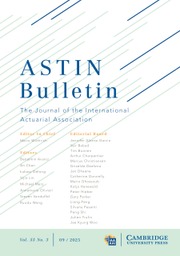Article contents
Bonus-malus Systems in a Deregulated Environment: Forecasting Market Shares Using Diffusion Models
Published online by Cambridge University Press: 17 April 2015
Abstract
In a deregulated insurance market, insurance carriers have an incentive to be innovative in their pricing decisions by segmenting their portfolios and designing new bonus-malus systems (BMS). This paper examines the evolution of market shares and claim frequencies in a two-company market, when one insurer breaks off the existing stability by introducing a super-discount class in its BMS. Several assumptions concerning policyholders and insurers behavior are tested. Diffusion theory is used to model the spread of the information concerning the new BMS among prospective customers. A wide variety of market outcomes results: one company may take over the market or the two may survive with equal or unequal market shares, each specializing in a specific niche of the market. Before engaging in an aggressive competitive behavior, insurers should consequently be reasonably confident in their assumptions concerning the reactions of their policyholders to the new BMS.
Keywords
- Type
- Workshop
- Information
- Copyright
- Copyright © ASTIN Bulletin 2005
References
- 2
- Cited by


